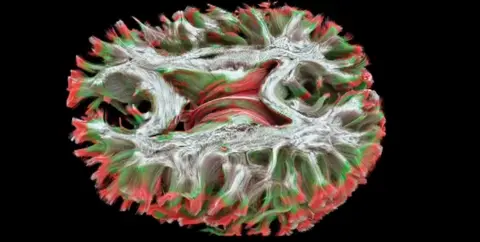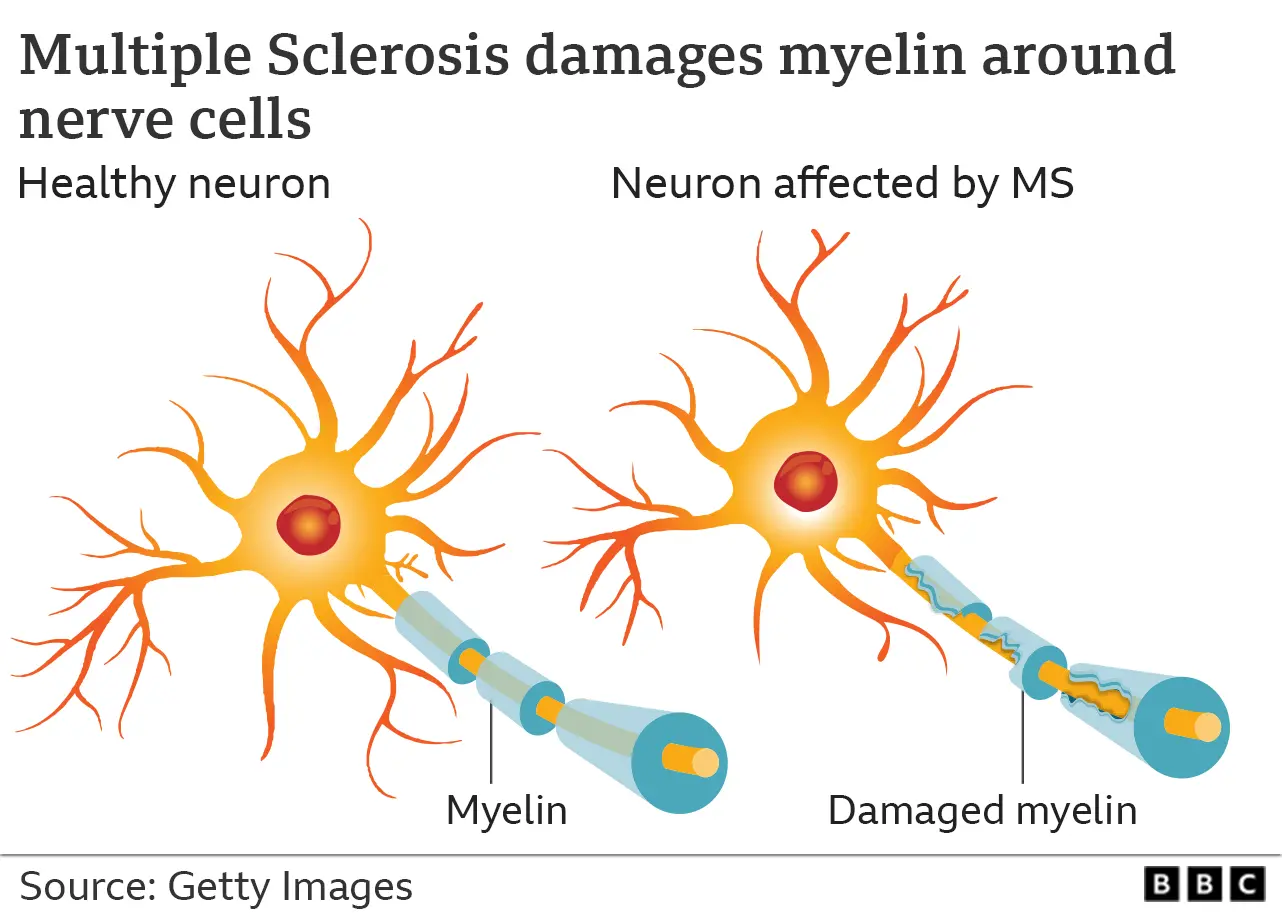Is a virus we all have causing multiple sclerosis?
 Getty Images
Getty ImagesNearly three million people around the world have multiple sclerosis. Scientists think they have now uncovered a mystery cause of this incurable disease. It is a virus that nearly every one of us can expect to catch. So what does it mean for treating and even preventing MS?

Our brains are an orchestra of electrical activity. Billions of individual players, called neurons, produce precise electrical signals. When they come together, the resulting symphony is who we are, our thoughts, our emotions, our control over our body and how we experience the world around us.
But in multiple sclerosis, there is a saboteur at work. Our own immune system turns against the neurons and they can no longer play in tune. The impact can be devastating.
 Cardiff University
Cardiff UniversityWhat leads the immune system astray has been a long and hotly debated mystery, but studies published this year have convincingly pointed the finger at the Epstein-Barr virus.
"It is very, very strong evidence that this virus is likely to be the cause of multiple sclerosis," Prof Gavin Giovannoni, from Queen Mary University of London, told me.
Detective work
Epstein-Barr virus (EBV) is so common that nearly all of us can expect to catch it during our lives. Most of us won't even notice, but the virus is famous for "the kissing disease", which is also known as either glandular fever or mononucleosis. EBV has been on the list of suspects for MS for decades, but definitive proof has been hard to gather because the virus is so common and multiple sclerosis is so rare.
 Getty Images
Getty ImagesThe crucial piece of evidence has come from the US military, which takes blood samples from soldiers every two years. These are kept in the freezers of the Department of Defense Serum Repository and have proven to be a goldmine for research.
A team at Harvard University went looking through samples from 10 million people to establish the connection between EBV and multiple sclerosis.
Their study, published in the journal Science, found 955 people who were diagnosed with multiple sclerosis and, using the regular blood samples, they were able to chart the course of the disease.
"Individuals who were not infected with the Epstein-Barr virus virtually never get multiple sclerosis," Prof Alberto Ascherio, from Harvard, told me.
"It's only after Epstein-Barr virus infection that the risk of multiple sclerosis jumps up by over 30-fold."
The team checked for other infections, such as cytomegalovirus, but only EBV had a crystal clear connection with the neurodegenerative disease.
The soldiers caught the virus. Then signs of injury to the brain - called neurofilament light polypeptide, which is essentially the rubble from damaged brain cells - started to appear in the blood. Then they were diagnosed with MS around five years after the infection.
 Getty Images
Getty ImagesProf Ascherio says the study is the "first" compelling evidence that EBV is causing the disease. He said it was "quite common" for viruses to infect lots of people, but only cause severe complications in a few. For example in the world before vaccines, "virtually all children" would catch polio but one in 400 would develop paralysis.
But how to be sure?
It will take a study that is able to prevent people catching EBV - and see if that also prevents multiple sclerosis - to definitively prove the virus has a critical role in the disease.
But there is ongoing research unpicking what the virus is doing inside the body.
If we focus on a single neuron - one instrument in the brain's orchestra - it is coated in a fatty layer of insulation called the myelin sheath. It is this layer of fat that allows electrical signals to hurtle down neurons at speeds of 100 meters per second. But in multiple sclerosis, the immune system attacks the myelin, disrupts the electrical messages and eventually damages the neuron.
Depending on which part of the brain or spinal cord is affected, multiple sclerosis can lead to numbness, blurred vision, difficulty walking, slurred speech and some people find their memory or emotions are affected.

Prof Bill Robinson, an immunologist at Stanford University in California, was an EBV sceptic until a couple of years ago. "I was dismissive, everybody has EBV so there's no way it can really cause MS."
Now he's not only a fully convinced convert, he thinks he can join the dots between the virus and the myelin sheath.
His study, published in the journal Nature, showed the myelin sheath suffers from mistaken identity and is attacked by a confused part of the immune system that thinks it is fighting EBV.
His team was looking at B cells, which are the part of the immune system that manufactures antibodies to seek out viruses and other threats. These antibodies stick to the invader and signal to the rest of the immune system to come and attack.
In MS patients, they found antibodies that were designed to attack part of the virus (a protein called EBNA1) could also stick to a human protein in the brain (called GlialCAM). This case of mistaken identity, at the molecular level, is known scientifically as a cross-reaction.
Prof Robinson said: "[The virus] is inducing a cross reactivity between a viral protein that also looks like a myelin sheath protein, which results in damage that causes the symptoms of MS."

- Listen to Inside Health: Multiple sclerosis and the Epstein-Barr virus

Clearly this does not happen to everybody who is infected with EBV. And other factors come into play such as being born at higher risk of MS, being female, childhood trauma and where you live (low levels of the sunshine vitamin D) can increase the risk of the disease.
Can we do anything about it?
A clearer picture of the cause of multiple sclerosis gives a better idea of how to treat or even prevent it.
One grand vision is to repeat the success of tackling the cancer-causing human papillomavirus (HPV). Infections with HPV can increase the risk of cancers including those in the cervix, penis and mouth. But a childhood vaccination programme has had such a profound impact on the cancers that the old routine of regular smear tests may no longer be necessary.
There are several companies already working on an EBV vaccine, including Moderna, which is using the same technology it used to rapidly develop a Covid vaccine. However, vaccines will need to ensure they don't trigger the immune system to make the same rogue antibodies that have been implicated in multiple sclerosis.
 Getty Images
Getty ImagesFinding out if a vaccine can prevent multiple sclerosis is going to take decades of work. The earlier ambition is a "therapeutic vaccine" for people who already have MS.
Prof Giovannoni said this would be similar to the shingles vaccine, which is given to people who have already been infected with the chickenpox virus so "even though you've got the virus already, you are boosting the immune system to mount an immune response against the virus and controlling the virus itself."
Therapies that target B cells that have been infected with EBV - and drugs that attack the virus itself - are also being investigated. Prof Giovannoni said some studies suggested HIV drugs reduced the risk of getting MS so "there's a little hint" that HIV antiretroviral drugs may work in MS.
But there are still massive uncertainties. Once you get EBV, you are stuck with it in your body for life - as it takes up residence in those antibody-making B cells. So is it the initial infection that sets the immune system down the wrong path? Or is it the continual presence of the virus agitating the immune system that leads to MS? Researchers have made huge strides in understanding the causes of multiple sclerosis, but harnessing that knowledge to make a difference to people's lives is a whole new challenge.
Follow James on Twitter

More from Inside Health
- Long Covid: 'I've had long Covid for two years now'
- Sickle cell: 'The revolutionary gene-editing treatment that gave me new life'
- Cervical cancer: Vaccines could mean only one smear test a lifetime
- Animals for organs: Are pigs the future of organ transplants?
- Asthma: Why switching inhaler could be better for you and the planet
- Vegan ready meals: How healthy are they?
